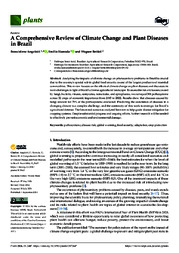A comprehensive review of climate change and plant diseases in Brazil.
A comprehensive review of climate change and plant diseases in Brazil.
Author(s): ANGELOTTI, F.; HAMADA, E.; BETTIOL, W.
Summary: Analyzing the impacts of climate change on phytosanitary problems in Brazil is crucial due to the country’s special role in global food security as one of the largest producers of essential commodities. This review focuses on the effects of climate change on plant diseases and discusses its main challenges in light of Brazil’s diverse agricultural landscape. To assess the risk of diseases caused by fungi, bacteria, viruses, oomycetes, nematodes, and spiroplasms, we surveyed 304 pathosystems across 32 crops of economic importance from 2005 to 2022. Results show that diseases caused by fungi account for 79% of the pathosystems evaluated. Predicting the occurrence of diseases in a changing climate is a complex challenge, and the continuity of this work is strategic for Brazil’s agricultural defense. The future risk scenarios analyzed here aim to help guide disease mitigation for cropping systems. Despite substantial progress and ongoing efforts, further research will be needed to effectively prevent economic and environmental damage.
Publication year: 2024
Types of publication: Journal article
Unit: Embrapa Semi-arid Region
Observation
Some of Embrapa's publications are published as ePub files. To read them, use or download one of the following free software options to your computer or mobile device. Android: Google Play Books; IOS: iBooks; Windows and Linux: Calibre.
Access other publications
Access the Agricultural Research Database (BDPA) to consult Embrapa's full library collection and records.
Visit Embrapa Bookstore to purchase books and other publications sold by Embrapa.

